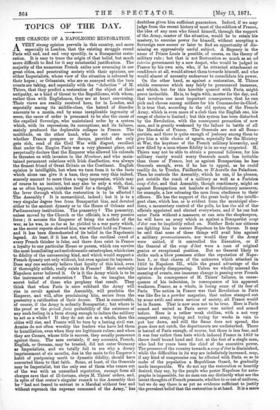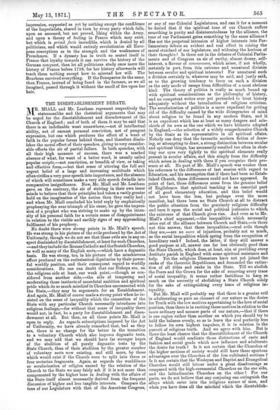TOPICS OF THE DAY. ,
THE CHANCES OF A NAPOLEONIC RESTORATION.
AVERY strong opinion prevails in this country, and more especially in London, that the existing struggle round Paris will end, and end very speedily, in a Bonapartist resto- ration. It is easy to trace the origin of that belief, but much more difficult to find for it any substantial justification. The majority of the numerous French exiles now swarming in our great cities, and penetrating society with their opinions, are either Imperialists, whose view of the situation is coloured by their hopes ; or Orleanists, who are so annoyed with the turn events are taking, and especially with the " defection " of M. Thiers, that they predict a restoration of the object of their antipathy, as a kind of threat to the Republicans, with whom, rather than with Englishmen, they are at heart conversing. Their views are readily received here, for in London, and especially among its middle-class, the hatred of disorder amounts to a mania, and by some inexplicable ingenuity of error, the cause of order is presumed to be also the cause of the expelled Sovereign, who maintained order by a system which, with its repressions, its corruptions, and its failures, mainly produced the deplorable collapse in France. The multitude, on the other hand, who do not care much whether France prospers or decays, provided she only gets rich, read of the Civil War with disgust, recollect that under the Empire Paris was a very pleasant place, and perpetually declare that the Emperor who allowed his colonels to threaten us with invasion in the Moniteur, and who main- tained permanent relations with Irish disaffection, was always the firmest friend of Great Britain on the Continent. English opinion is intelligible, but when we turn from it to the facts which alone can give it a base, they seem very thin indeed, scarcely amount to more than a vague impression, which may of course be an instinct, but may also be only a wish, that, as so often happens, mistakes itself for a thought. What is the lever through which the restoration is to be effected ? The Assembly It is monarchical, indeed ; but it is to a very singular degree free from Bonapartist bias, and devoted either to the ancient dynasty or to the House of Orleans and Parliamentary institutions. The peasantry ? The peasantry, unless moved by the Church or the officials, is a very passive force ; it accuses the Emperor of being the author of the war, as he was, in so far as he yielded to a war party which, as the secret reports showed him, was without hold on France ; and it has been disenchanted of its belief in the Napoleonic legend. At least, if it has not, then the cardinal creed of every French thinker is false, and there does exist in France a loyalty to one particular House or person, which can survive the most humiliating and melodramatic catastrophes, which rises to fidelity of the unreasoning kind, and which would support a French dynasty not only without, but even against its bayonets. Does any one seriously believe that loyalty of this kind, even if thoroughly selfish, really exists in France? Most certainly Napoleon never believed it. Or is it the Army which is to be the instrument of restoration That is, we imagine, the secret belief of those who prophesy that result. They think that when Paris is once subdued the Army will rise in revolt against the Assembly, will proclaim the Emperor, and will, after proclaiming him, secure from the peasantry a ratification of their decree. That is conceivable, of course, if the Army is ardently Bonapartist ; but where is the proof or the prima facie probability of the existence of any such feeling in a form strong enough to induce the soldiery to act as a whole ? If they do not act as a whole, then the cities will rise, and France will be torn by a lasting civil war. Armies do not often worship the leaders who have led them to humiliation, even when they are legitimate rulers; and when they are Camara, whose title is success, they usually pronounce against them. The men certainly, if any accounts, French, English, or German, may be trusted, did not enter Germany as Imperialists, and we totally fail to see why a dreary imprisonment of six months, due in the main to the Emperor's habit of postponing merit to dynastic fidelity, should have converted them to that faith. Some, at least, of the Generals may be Imperialist, but the only one of them who comes out of the war with an unscathed reputation, exempt from all charges save that of ill-fortune, obeys M. Thiers' orders, and, in spite of that orator's singular remark to the Assembly that he "had, not feared to entrust to a Marshal without fear and without reproach the supreme command of the Army," has doubtless given him sufficient guarantees. Indeed, if we may judge from the recent history of most of the soldiers of France, the idea of any man who found himself, through the support of the Army, master of the situation, would be to retain his mastery, to exercise power for himself, without accepting a. Sovereign sure sooner or later to find an opportunity of dis- missing an oppressively useful subject. A Regency in the name of Prince Louis is possible, of course, on the theory of military rule ; but that is not Restoration so much as an ad interim government by a new despot, who would be judged in France by his own acts, who, if he attracted attachment or confidence at all, would attract them towards himself, and who would almost of necessity endeavour to consolidate his power.
On the other hand, as against a restoration, M. Thiers wields resources which may fairly be pronounced immense,. and which, but for this horrible quarrel with Paris, might prove invincible. He is, to begin with, master for the day, and that involves one most important consequence, that he can pick and choose among soldiers for his Commander-in-Chief.. It is true that, according to the old system of the French Army, which is even more of a club than the English one, his range of choice is limited ; but this system has been disturbed. by the Revolution, with the consequent promotion of new men, and is greatly weakened by the failure in battle of all the Marshals of France. The Generals are not all Bona- partists, and there is quite enough of jealousy among them to give him a wide choice of agents, especially for the Ministry at War, the keystone of the French military hierarchy, and' now filled by a man whose fidelity is in no way suspected. K. Thiers may not be able to obtain a personal follower, for hin military vanity would worry Generals much less irritable. than those of France, but as against Bonapartism he haw Generals enough, even if he has to appeal, as he could readily do, to Trochu, Faidherbe, or D'Aurelle des Paladines. Then he controls the Assembly, which he can, if he pleases, put outside the reach of a military as well as a Parisian coup (Neat, and that Assembly, though reactionary, might an against Bonapartism not hesitate at Revolutionary measures;. for example, a law releasing the men from obedience to their- officers. He has the support of the great body of the intelli- gent class, which has, as is evident from the municipal elec- tions, a momentary control of the polls, he has the aid of the. officials appointed and elected everywhere, and if he can but enter Paris without a massacre, or can arm the shopkeepers, he will have an army which as against a Bonapartist coup- d'e?at can be implicitly relied on. Neither Reds nor citizens- are fighting him to restore Napoleon to his throne. It may be said that none of these things will avail him against a military pronunciamento, nor would they if the Army were united, if it controlled the Executive, or ii the General of the coup d'etat were a man of original genius or exceptional position. But no General likely to strike such a blow possesses either the reputation of Napo- leon I., or . that charm of the unknown which attached in 1852 to Napoleon III., while the grand advantage of the latter is slowly disappearing. Unless we wholly misread the meaning of events, one immense change is passing over French opinion. In consequence of M. Thiers' failures, in conse- quence of his indecision, in consequence of his apparent weakness, France, as a whole, is losing some of its fear of Paris. The notion in France was that Revolution in Paris was like fire in a powder magazine, that unless stamped out by some swift and stern saviour of society, all France would be in flames. That is now seen not to be true. Here is Paris armed and united as Paris never was united and armed before. Here is a rather weak civilian, with a not very competent army, trying and trying for weeks in vain to. put her down, and still the flame does not spread, the grass does not catch, the departments are undisturbed. There is hatred of Paris enough, of course, but there is less fear, and it was fear rather than hate which induced France in 1852 to throw itself bound hand and foot at the feet of a single man, who had for years been the chief of the executive power. The pressure of the country towards a coup d'etat is diminished, while the difficulties in its way are indefinitely increased, may,. if any kind of compromise can be effected with Paris, so as to. make of the population a Republican Guard, be gradually made insuperable. We do not say the restoration so heartily desired, they say, by the people who pester Napoleon for auto- graphs is impossible, for no man can say distinctly what are the latent thoughts of French peasants, whether in or out of uniform, but we do say there is as yet no evidence sufficient to justify the prevalent belief that the restoration is at hand. It is a mere
impression, supported as yet by nothing except the confidence of the Imperialists, shared in turn by every party which falls, upon an assumed, but not proved, liking within the Army, and upon a theory of feeling in France which may exist, but which is primd facie incredible, which is denied by all politicians, and which would entirely revolutionize all Euro- pean conceptions as to the strength and the weaknesses of Frenchmen. If a dynasty has in truth so seated itself in France that loyalty towards it can survive the history of the German conquest, then let all politicians study once more the history of France before 1798, for her history afterwards will teach them nothing except how to misread her will. The Bourbons survived everything. If the Bonapartes do the same, then France, instead of being fused in the furnace, as we all imagined, passed through it without the smell of fire upon her hair.



































 Previous page
Previous page